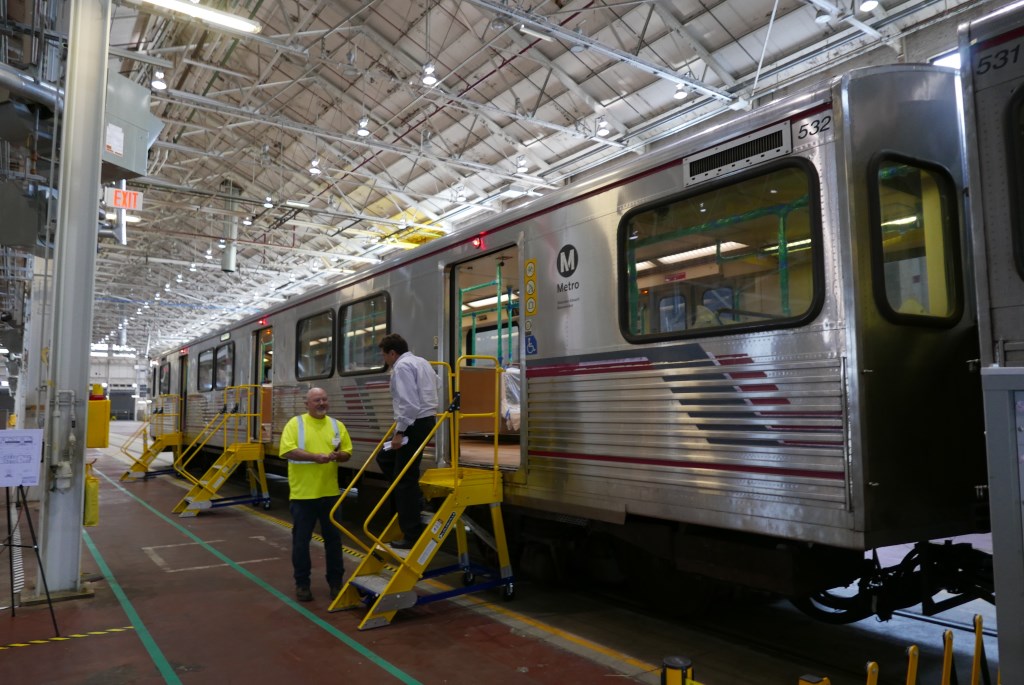
Returns to central city plant here, will service and repairs trains for U.S. customers.
By Graham Kilmer - Jul 17th, 2017 04:30 pm

Subway cars inside Talgo facility. Photo by Graham Kilmer.
Many will remember when the last train from Talgo, the international train manufacturer based in Spain, left town as the company closed its shop in central city Milwaukee. Well, the company has now returned to its old facility at 3533 N. 27th St, in the Century City Business Park, formerly the site of A.O Smith, and last week held a grand reopening of sorts, with city officials there to celebrate.
While Talgo specializes in manufacturing high-speed and transit trains around the world, the plant will handle the repair and maintenance of trains, at least for now. The facility will also has the capacity to manufacture trains, and will be the first production facility for Talgo in the US. They also have a maintenance facility in Seattle, Washington.
The reopened Talgo facility and its production capacity gives the company a stronger foothold in the U.S. market. It recently secured a contract with The Los Angeles County Metropolitan Transportation Authority to repair subway cars. For Milwaukee officials, it was an opportunity to bring jobs to a long blighted part of the city.
Antonio Perez
For the next 56 months Tango employees here will work to fulfill the Los Angeles contract, which is worth $72.9 million. Perez said the company estimates that the yearly market for the kind of work they are doing at the Milwaukee plant is more than $180 million.
“There are like 25 different transit agencies in the United States,” Perez said. “We have won the contract of only one.”
Theoretically, if Talgo is awarded more contracts, the facility in Milwaukee will grow and bring on more employees.
“This is a good start,” said the local Ald. Khalif Rainey, hoping the plant will continue to grow and hire more employees from his district. Rainey added that he hopes having an international firm like Talgo in his district will send the message to other corporations that there is a “ready and willing” workforce, as Mayor Tom Barrett put it, in central Milwaukee.
“We can actually have a work, live, play model right here in a, hopefully, soon-to-be-formerly distressed neighborhood,” Rainey said.
Department of City Development Commissioner Rocky Marcoux was among those that maintained a relationship with the Spanish firm after state lawmakers shuttered a deal with the firm in a series of decisions that cost the state $50 million. He said there’s a “myth” about Talgo’s new neighborhood, that the workforce has been sitting idly by, waiting for jobs to return; rather, he said, they’re skilled and working, but “want an opportunity at that same family-supporting job that they used to have.”
Perez concurred. Along with the location being logistically promising, he said the available “skilled workforce” was an important part of the deal.
“We’re doing everything we can to breathe life back into this location,” Barrett said. As an old industrial-area of the city, the Talgo plant sits on “dozens and dozens of acres of land,” Barrett said. “So when people talk about skills gap, in some ways it’s a geography gap. We’ve got that land here and we’ve got the people that want to do the work.”
Barrett said the city was “very pleased to welcome Talgo back to the community,” — especially after Gov. Scott Walker rejected the high-speed rail project, for which Talgo would have supplied the trains. And after Republican legislators decided not to honor a contract with the manufacturer for new trains on the Hiawatha line between Milwaukee and Chicago.
Taxpayers ultimately footed the bill on a settlement with Talgo that cost millions more than the original contract was worth.
“The City of Milwaukee never ever ended our relationship or let it get acrimonious,” Barrett said, later adding, “Even though the state burned their bridge, and tried to burn it again, and burn it again, and burn it again.”
Perez said transit maintenance and even production has a far more stable funding stream in the US, whereas the “high speed train business” has “a political bias,” as he put it. “The Democrats they think one way, the Republicans think a different way.”
Inside Talgo
More about the History of Talgo in Milwaukee
- The Return of Talgo - Graham Kilmer - Jul 17th, 2017
- Plenty of Horne: Welcome Back, Talgo USA! - Michael Horne - Nov 25th, 2016
- Eyes on Milwaukee: Talgo Coming Back to Milwaukee - Jeramey Jannene - Sep 26th, 2016
- Op-Ed: Walker’s High Speed Folly - Spencer Black - May 26th, 2016
- Murphy’s Law: The Twisted Tale of Talgo - Bruce Murphy - Aug 25th, 2015
- The Last Train from Talgo - Bruce Murphy - May 29th, 2014
- Back in the News: Michigan May Get Talgo Trains - Bruce Murphy - Apr 14th, 2014
- Plenty of Horne: State Delays on Talgo Claim - Michael Horne - Dec 12th, 2013
- Back in the News: Talgo Files Claim Against State - Bruce Murphy - Nov 8th, 2013
- Murphy’s Law: Did the State Screw Talgo? - Bruce Murphy - May 31st, 2012
- Eyes on Milwaukee: Tour the Talgo Trains You Might Never Ride - Jeramey Jannene - May 17th, 2012
- The train is gone, why does Talgo have to go with it? - Patti Wenzel - Dec 13th, 2010
- Talgo Location Choice a No-Brainer – Milwaukee - Jeramey Jannene - Jul 30th, 2009